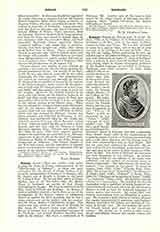

Ronaard, PIERRE DE, French poet, b. 2 (or 11) September, 1524, at the Chateau de la Poissonniere, near Vendome; d. December 27, 1585, at the priory of Saint-Cosme-en l’Isle, near Tours. He was first educated at home by a private tutor, and at the age of nine was sent to the College of Navarre, in Paris. Having left the college before graduating he was appointed page to the Duke of Orleans, son of Francis I, and soon afterwards to James V, King of Scotland. After a sojourn of three years in Scotland and England, during which he became thoroughly proficient in the English language, he travelled in Germany, Piedmont, and other countries. In 1541, being afflicted with an incurable deafness, he retired from public life and for seven years devoted his entire time to study. He studied Greek under the famous scholar Dorat, at the College de Coqueret. His ambition was to find new paths for French poetry, and he was soon recognized as the “Prince of Poets”, a title he merited by his “Odes” (1550), “Amours de Cassandre”, etc. He was a great favorite with Charles IX; Elizabeth, Queen of England, sent him a diamond; Mary Stuart found relief in her imprisonment in reading his poems; the City of Toulouse presented him with a solid silver Minerva; and the literary men of that time acknowledged him as their leader. His last ten years were saddened by ill-health. He retired to Croix-Val-en-Vendomois, in the forest of Gastine, and then to the priory of Saint-Cosme-en l’Isle, where he died. The works of Ronsard are numerous and their chronology is very intricate. In twenty-four years (1560-84) six editions of his works were published, and the number of occasional pieces is almost incalculable. The following are the most important: “Les Amours de Cassandre” (2 books of sonnets, Paris, 1550), “Odes” (5 books, Paris, 1551-1552), “Le bocage royal” (Paris, 1554), “Les Hymnes” (2 books, Paris, 1556), “Poemes” (2 books, Paris, 1560-73), “Discours sur les miseres du temps” (1560), “La Franciade” (Paris, 1572). His influence and his reforms were far-reaching. He enriched the French vocabulary with a multitude of words borrowed not only from Greek and Latin, but from the old romance dialects as well as from the technical languages of trades, sports, and sciences. His many rules concerning verse-making were as influential as numerous. He invented a large variety of metres, adopted the regular intertwining of masculine and feminine rhymes, proscribed the hiatus, and introduced harmony in French verse. He was perhaps the greatest French lyrical poet prior to the nineteenth century. His themes are as varied as their forms, simple and sublime, ironical and tender, solemn and familiar.
LOUIS N. DELAMARRE

